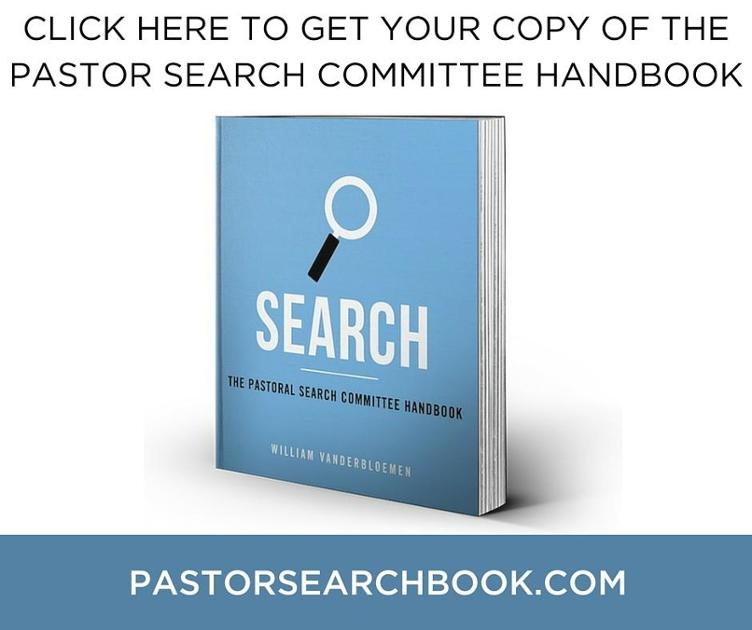13 Ways To Sabotage Your Senior Pastor Search
By: Vanderbloemen

Choosing a new Senior Pastor may be the most significant staffing decision a church ever has to make. Because of that, it can also be one of the most stressful processes a church ever has to experience.
We’ve walked with countless churches through the important decisions and the possible anxiety of a Senior Pastor search, and along the way, we’ve noticed a few ways that pastor search committees can be counter-productive during the Senior Pastor search process.
Here are 13 ways to sabotage your Senior Pastor search:
1. Have unrealistic expectations.
Do you expect that your new Senior Pastor is going to be exactly like your past Senior Pastor? Do you think your final candidate will check off every box on your wishlist? Do you know the differences between the attributes you want and the ones you really need in your next Pastor? Check out our article on Desireables vs. Practicals.
2. Don't manage the expectations of church.
Does your congregation expect that the new Senior Pastor is going to be able to fix all your problems? Download our Pastor Search Prayer Calendar to assist your congregation in praying through your search.
3. Have too many people involved in the decision process.
There’s a lot of truth to the phrase, “Too many cooks in the kitchen.” It’s also very important to make sure that your pastor search committee members don’t have an agenda. If a decision-maker is insisting on their own agenda throughout the Senior Pastor search, it will constantly stall and muddy the process.
4. Disagree with one another.
Whether or not you’re using a search firm to help you find your next Senior Pastor, the decision-makers for the search (Search Committee, Elders, Board, etc.) need to have clarity and agreement on what they are looking for before beginning to evaluate and interview candidates. Read What To Do When Your Pastor Search Committee Can’t Agree.
5. Have unproductive and disorganized meetings.
If you don’t have a clear timeline for your Senior Pastor search, detailed agendas for your meetings, and specific roles for your committee members, you’re sure to have an unproductive, disorganized, and frustrating search process (which candidates will most likely pick up on).
6. Be closed off to anyone different than your previous Pastor.
If you want exactly what you had last time and if you aren’t open to any differences, you will always be disappointed. And you’ll discourage and scare away your potential candidates who cannot possibly meet your expectations.
7. Don’t involve the spouse of the candidate in the interview process.
This caveat is two-fold. First, a candidate’s spouse may not be totally on board with the new job prospect if your church overlooks or ignores them during the interview. Make sure the spouse knows how welcomed they would be as well. Secondly, too often we’ve seen churches hire a pastor without interviewing their spouse, only to find marriage issues or job conflicts later. For this reason, when we conduct Senior Pastor searches, our Search Consultants always interview the final candidate’s spouse as well. Here’s a helpful article on how to make the candidate’s spouse feel welcome.
8. Be overly invasive in the interview process and the background search.
Remember that the interview process is part of building your relationship with your potential new Senior Pastor. Background and reference checks are vitally important, but if you come across as overly invasive – for example, hiring a Private Investigator to check out your candidate – you are already setting that relationship up with a foundation of distrust.
9. Take too long with the interview process.
It’s important to note that your Senior Pastor candidate is interviewing you, as well. If you take too long to communicate with them, bring them in for interviews, or make decisions, that will be indicative to them of the way your church makes decisions and will likely drive them away from the position. Check out more of our thoughts on this.
10. Judge candidates by their preaching videos alone.
When you judge candidates solely by their teaching sample videos, you’re not always taking into account the context and setting of their videos. Remember that it’s vital to have a balance of shepherding and teaching attributes in your Senior Pastor, and you can’t always see those shepherding and discipling strengths in a candidate’s preaching sample video.
11. Put too much emphasis on a particular style of preaching.
If you’re set on one specific style of preaching, you may rule out a lot of very high-capacity candidates. Biblical preaching should be the goal, not a particular style.
12. Surprise your candidates late in the interview process.
As I mentioned before, if you aren’t completely honest with your candidates from the beginning of theinterview process, you build your relationship with your potential Senior Pastor on a foundation of mistrust. For example, if you sweep all the dirt under the rug at first and then during the late stages of the interview process you disclose that the church is in a lot of debt or that there is unrest amongst your staff, you have a high risk of losing that candidate. Be open and honest about the church and your situation from day one, and your candidates will trust you.
13. Don’t follow through with promises you made during the interview process.
Don't over-promise things to candidates that you aren't willing to make reality once they’re in their new position. If you put a lot of limits on the changes that the Senior Pastor can make after they’ve begun pastoring your church, you may find yourself looking for a new Senior Pastor quite soon.
What other ways can a church thwart their Senior Pastor search?
If you liked this, then you’ll also like 5 Common Pitfalls of Pastoral Search Committees.




